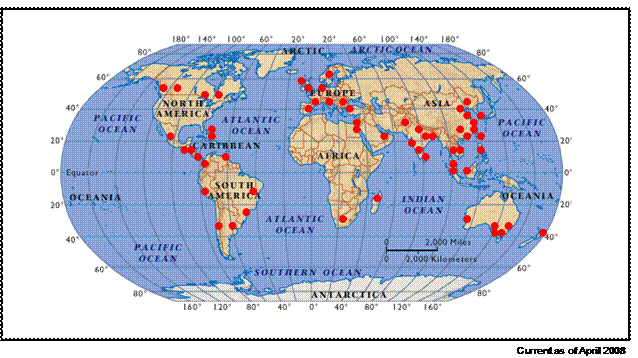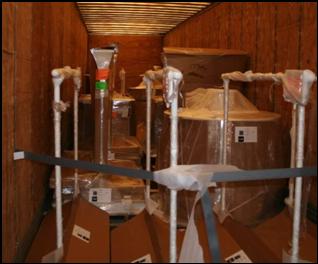BNSF Logistics Expands Internationally
Springdale, Arkansas USA
May 1, 2008
By
Evan Armstrong
Key Personnel:
Eric Wolfe, Vice President & General Manager
Andy Cordischi, Vice President – Technology & Engineering
Frank Armstrong, Vice President – Business Development
Mark Richards, Vice President – Finance
Mike Lancaster, Vice President & General Manager – BNSF Logistics International
Justin Hewitt, Director – Business Development
Lynda Norris, Director – M&A/Procurement
Shannon Boyd, Director – Business Development
BNSF Logistics Company Overview
Founded in 2002, rapidly growing BNSF Logistics (BNSFL) is managing over $320 million in annual transportation spend for a diverse customer base and provides both non-asset based domestic and international transportation management services. In 2007, its gross revenues were $219 million and BNSFL is on track to generate revenues of $275 million in 2008. With recently acquired international freight forwarding and non-vessel operating common carrier (NVOCC) operations, BNSFL has taken significant steps to reposition itself in the third-party logistics market from a North American centric transportation manager to a major market global supply chain manager.
While over half of its growth has been organic, BNSFL has used strategic acquisitions to build a network of 24 offices and to increase the breadth of its service offerings. Today, with six successful acquisitions under its belt, BNSFL has additional acquisitions planned to close in the next year.
Its acquisition history is detailed below:
► February 1, 2008: Diversified Freight Logistics and Royal Cargo Line
• Non-asset based international freight forwarder, NVOCC and customs broker
• 45 employees and a network of over 1,700 agents
• Two warehouses with 38,000 square feet
• Gross revenues of $40 million in 2007
► January 2, 2007: Pro-Am Transportation Services
• Non-asset based domestic transportation management company
• 23 employees
• Gross revenues of $25 million in 2006
► June 7, 2004: Sumark Services
• Non-asset based domestic transportation management company
• 54 employees
• Gross revenues of $40 million in 2003
► May 3, 2004: Rite Choice Transport
• Small non-asset based domestic transportation management company
• Gross revenues estimated at $5 million for 2003
► September 15, 2003: MRS Companies
• Non-asset based domestic transportation management company
• 34 employees
• Gross revenues estimated at $16 million for 2002
► August 13, 2002: Burlington Northern Santa Fe Corporation (BNSF) announced the formation of BNSF Logistics, LLC.
• BNSFL acquired certain assets of Clicklogistics, Inc.
• Clicklogistics was a non-asset based domestic transportation management company.
Managing BNSFL’s rapidly expanding operations is a strong operations team. Many of the team worked with Eric Wolfe while at J.B. Hunt Logistics and Cardinal Logistics. This close knit group is long on logistics operating and engineering experience. Key people have also been added through acquisitions and from the railway further strengthening the organization and rounding out the team’s leadership capabilities.
Much of BNSFL’s organic growth has come from its ability to effectively manage rail in addition to intermodal and truck transportation. Rail-related transportation accounts for approximately 20% of its total transportation under management and BNSFL is one of a handful of US based third-party logistics providers (3PLs) who can effectively manage bulk rail transportation. This multi-modal competency coupled with value-added services and strong information technology provides BNSFL with a competitive advantage awarding it entree into large accounts with rail and truck transportation needs. Value-added services include: cross-docking, transloading, expedited truck/rail service, pool distribution, and supply chain network analysis and re-design. Georgia-Pacific, The Home Depot, JCPenney, Lowe’s, Rio Tinto, and Wal-Mart are major BNSFL customers.
BNSFL configures technology solutions to be responsive to each customer’s business scope. For contract logistics customers, it utilizes i2 Transportation Modeler for shipment optimization, consolidation and mode selection between rail, intermodal and truckload and MercuryGate’s transportation management system for supply chain tendering, tracking and visibility. MercuryGate is also fully integrated with BNSFL’s proprietary operations/dispatch system to share information with BNSFL’s Transportation Execution Services group (TES). BNSFL International’s technology provides purchase order (PO) management and handles all transactions for global shipping.
BNSF Logistics International
BNSFL International was created from BNSFL’s recent acquisitions of Diversified Freight Logistics and Royal Cargo Line and its offices are located in Grapevine and Houston, Texas and Tulsa, Oklahoma.
BNSFL International’s core service offerings include:
► Global ocean transportation (NVOCC, Ocean Transportation Intermediary)
• Door to door, port to door and port to port
• Project freight
• Ro/Ro (roll-on/roll-off)
• FCL (full container load) and LCL (less than container load)
► Global air transportation (Indirect Air Carrier)
• Expedited, charter, door to door, airport to door and airport to airport
► Customs brokerage
• Customs clearance, reconciliation, duty drawback, temporary import bonds and customs compliance
► Value-added services
• Insurance, AES (automated export system) filings, letters of credit and PO management
BNSFL International maintains memberships in the World Cargo Alliance, Advanced Professional Logistics Network, and the WCA Family of Logistics Networks, which enables access to agents world wide. The figure below indicates those areas in which BNSFL International has existing agent relationships in addition to its offices in the United States.
BNSF Logistics International Global Network

While BNSF works to integrate its newly acquired international freight forwarding expertise, the two case studies below illustrate some of its recent domestic logistics management work.
John Deere Construction Equipment Case Study
Overview
John Deere manufactures most of its construction equipment in Davenport and Dubuque, Iowa and manufactures excavators in Kernersville, North Carolina. These plants have direct rail service; however, Deere’s network of United States and Canadian dealers are not served by rail and the traditional mode of shipping finished product to the retail stores has been by truck.
Logistics Challenge
The price differential between truck and rail was not an issue until recently when Deere discontinued subsidizing transportation costs for its dealership network. By discontinuing the subsidy program, dealers focused on improving overall transportation management now that market forces were in play. These forces ultimately led Deere dealers to consider rail as the most economical transportation solution.
Starting in late 2007, Deere dealer groups began asking for rail service to the regions where they have retail stores. However, with no rail infrastructure at these destinations coupled with limited knowledge of rail transportation processes at origins, Deere and its dealer network truly needed an engineered rail management solution.
BNSF Logistics Solution
BNSFL recognized an opportunity to provide a turnkey solution for the dealers that included a combination of rail transportation, transloading, and over-the-road trucking. Since the dealers pay the freight and make the ultimate decision on mode, it was imperative that BNSFL develop its solutions directly for the dealers. Fortunately, most dealerships have consolidated over the last 10 years and some had centralized transportation functions managing shipments to multiple retail stores in a geographic region.
The first dealer that accepted the proposal was Pape Machinery. It operates approximately 20 different retail stores throughout Northern California and the Pacific Northwest. BNSFL identified three key distribution points (Stockton, Portland, and Seattle) to transload the machinery from railcars and provide truck delivery to the retail stores. Each store was assigned a rail transload site. Pape also has the ability to mix and match machines on a single railcar for different stores as long as they are assigned to the same rail transload site. This process allows BNSFL to efficiently provide rail transportation and build its rail load density.
The transload service scope includes unchaining and offloading and is performed by established providers on the BNSF rail network. Using its carrier base, BNSFL also supports the operations by supplying the truck capacity for final deliveries.
In addition to destination dealer logistics management, BNSFL is assisting Deere’s on-site 3PL with empty railcar orders, loading assistance, mechanical inspections, and EDI waybilling. BNSFL also maintains the rail rates in a confidential quote made directly with each respective railroad participating in the linehaul activity.
Outcome
BNSFL started shipping for Pape Machinery in February 2008 and is in final stages of negotiations with the largest Deere dealer conglomerate in North America–Brandt Tractor. Even when including the transload and final truck delivery cost, the estimated savings to the dealers from shipping by rail is estimated to be 25-50% versus over-the-road trucking. The expected volume between Pape and Brandt is approximately 200-250 railcars annually. BNSFL is currently pursuing additional dealership conglomerates which should add an additional 500 railcars annually.
 JCPenney Fixture Rollout Case Study
JCPenney Fixture Rollout Case Study
Overview
To maintain customer loyalty and expand its customer base, JCPenney (JCP) introduces new product lines and concepts within its retail store network. The retailer’s rollout of the American Living product line in early 2008 required a specialized transportation centric 3PL for shipping, temporary warehousing and tightly scheduled store deliveries. JCP selected BNSFL for the rollout.
Logistics Challenge
JCP contracted with two manufacturers for production of the American Living and Men’s Linear fixtures. The American Living fixtures were sourced in the US, required short-term storage after pickup from vendor, and were required to follow a tightly controlled delivery schedule to over 500 stores in the US and Puerto Rico. The fixture mix differed by store, so multiple load configurations were required. All fixture transportation was “high touch” needing blankets, straps, and load locks. In addition to typical store delivery schedule constraints, deliveries also had to be coordinated around anticipated highway congestion and route restrictions during Mardi Gras celebrations in Louisiana, Mississippi, and Alabama.
The Linear fixtures were sourced from Canada and load configurations were based upon a standard plan for each of the 200 stores. Customs clearance and border crossing coordination was also part of the project scope.
BNSF Logistics Solution
BNSFL established a cross-functional team of transportation experts from its Hoover, Alabama; Godfrey, Illinois, and Springdale, Arkansas offices. Site visits were made to the manufacturer’s locations to assess fixture dimensions, required pallet builds, and handling requirements. This information allowed BNSFL to develop tightly engineered load configuration plans. BNSFL also supplied on-site logistics personnel to facilitate the smooth start up of each manufacturing location and ensure process visibility.
Based upon the storage requirements for the American Living rollout, BNSFL executed short-term contracts with warehouse providers covering 35 warehouse locations. It conducted site visits to each facility serving a large volume of stores. Both JCP and BNSFL designated key personnel for issue escalation and resolution for the duration of the program.
BNSFL secured truck capacity from its existing carrier base and contracted with additional carriers for the Canadian origin point and local deliveries. In addition to the newly contracted warehousing locations, BNSFL also leveraged its past and existing warehouse relationships, including sites from the BNSF railroad preferred network.
Outcome
JCP filled thousands of fixtures orders and BNSFL managed the transportation to over 700 stores in less than eight weeks. The eight-week timeframe was primarily driven by the intermediate warehousing required to meet tight pickup and delivery date restrictions. Feedback from the two manufacturers and store locations indicated successful management of all aspects of the program.
Focusing on non-asset based domestic transportation management, Wolfe and his team have generated strong revenues and solid margins over the past two years. Under its management and newly acquired international capabilities, we expect BNSF Logistics to stay on track and quickly establish itself as an up and coming global 3PL.
Sources: A&A Primary Research, http://www.bnsflogistics.com/


